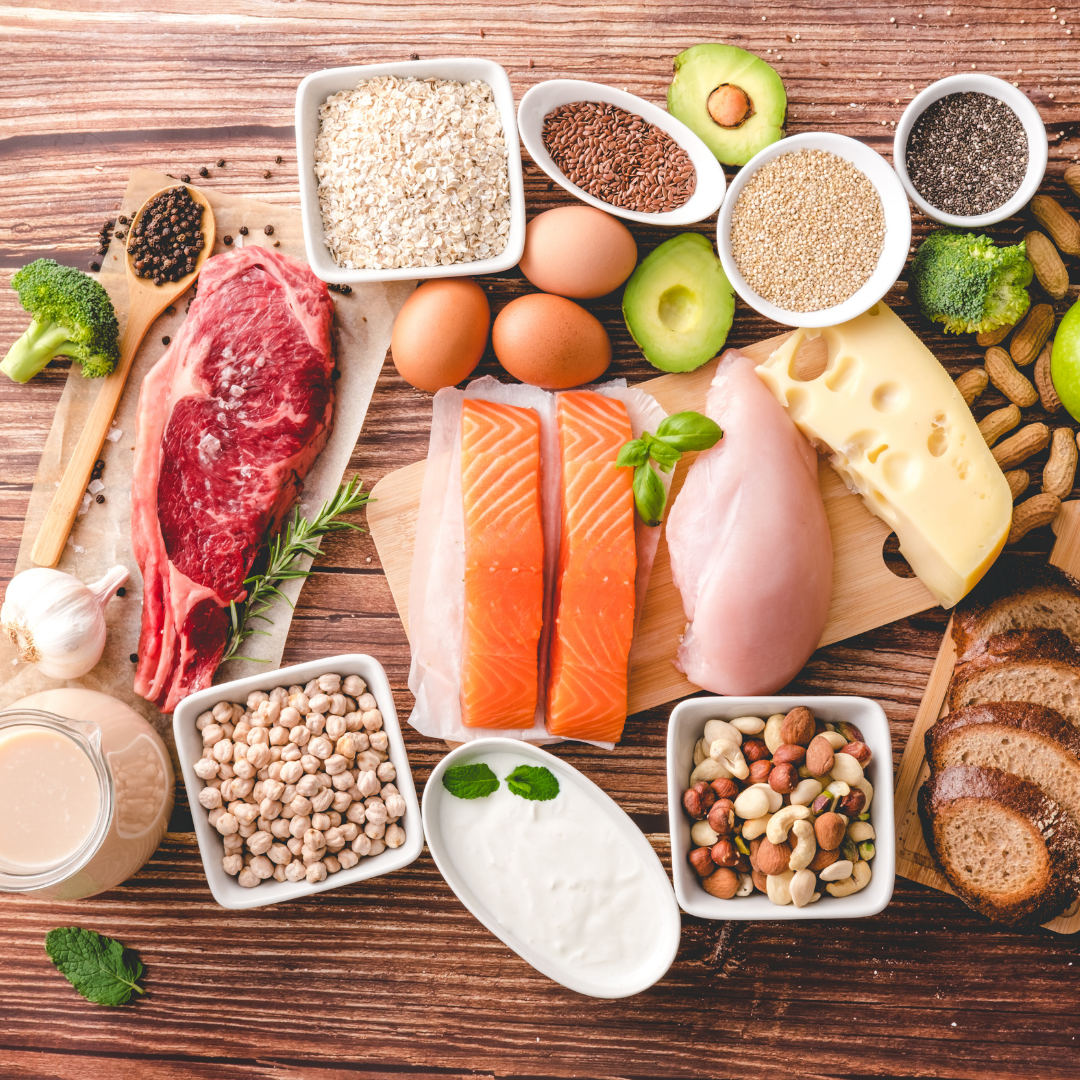In the last few years, ketogenic and low carb diets have come under scrutiny for supposedly trashing your thyroid and hormones, resulting in symptoms such as fatigue, sleep issues, and stalling weight loss. Is the solution to dive into a stack of carbohydrate-rich sweet potato pancakes? Not necessarily;
let’s separate fact from fiction.
1. If you’re having concerns: get your thyroid levels checked!
The thyroid gland influences virtually every organ system in the body and the hormones it secretes into the bloodstream play a vital role in regulating metabolism. Low thyroid hormone production - Known as hypothyroidism - is, unfortunately, a massive epidemic, especially amongst women.
In clinical hypothyroidism, elevated levels of thyroid stimulating hormone (TSH) indicate that the thyroid is no longer producing enough thyroxine (T4) and triiodothyronine (T3). This results in slowed down or impaired metabolic function (the rate at which the body converts food and oxygen to energy), resulting in fatigue, constipation, dry skin and brittle nails, an increased need for sleep, depression, and feelings of coldness, especially in the extremities. If left untreated, hypothyroidism will result in hair loss, impaired memory/cognition, numbness in the arms and legs, and face puffiness – a direct result of T3 insufficiency known as myxedema.
The most common form of hypothyroidism is an autoimmune disease known as Hashimoto’s thyroiditis. People with Hashimoto’s produce thyroid tissue antibodies that drive the immune system to attack and destroy the thyroid gland, resulting in hypothyroidism. And while there are a number of different blood tests that analyze thyroid function, there is lot of misinformation surrounding testing. As Dr Ted Naiman explains in this video, 99% of people just need to test TSH, free T4 (to determine a pituitary problem), and thyroid peroxidase autoantibody (to check for a thyroid related autoimmune disease).

2. Hypothyroid symptoms resulting from estrogen deficiency
Check your estrogen levels! Fatigue, ‘brain fog’, depression, sleep problems, a stall in weight loss, or weight gain are often blamed on the thyroid when they might more likely result from estrogen deficiency, especially in people that are perimenopausal. Estrogen deficiency is the sole cause for fat gain, metabolic issues, and mental health problems often witnessed during menopause. It is the primary hormone required for good health and well being; it is metabolically normalizing (regulating fat, insulin, and glucose) and thus is essential in order to maintain a minimum healthy body weight.
3. In the context of a ketogenic diet, slightly lower levels of T3 result from a diminished need to metabolize glucose and NOT from a poorly functioning thyroid
One of the functions of T3, alongside that of insulin, is to metabolize blood sugar. For this reason, high-carbohydrate diets are associated with elevated levels of blood sugar and thus with elevated levels of T3. On the other hand, low carbohydrate diets result in a decrease in blood sugar and consequently lower serum levels of T3.
Phinney et al. have examined the specific decline in T3 as a result of ketogenic diet, finding no association with resting oxygen uptake, or clinical symptoms of functional hypothyroidism such as cold intolerance, dry skin, hair loss, myxedema, or an increased need for sleep.
Despite decreased T3 concentrations, the subjects’ basal TSH levels remained normal, revealing that humans generally do not suffer from a deficit in thyroid hormone in association with carbohydrate restriction, provided calorie consumption is adequate (more on this later).
Generally, the reduction in T3 brought about by low carbohydrate intake demonstrates proper thyroid signalling, indicating that metabolism is working at a much more cost-effective and higher-quality level. To date, there exists no clinical evidence demonstrating that carbohydrate-restriction alone causes any symptom of inadequate thyroid hormone.
4. Lower thyroid, insulin, and metabolic rate may promote longevity
Very high thyroid levels are a marker for excessive insulin signaling. As has often been observed, hypermetabolic states lead to shorter lifespans in all animals (including humans). Thus significantly ramping up thyroid might not be ideal. Indeed, Kopp has hypothesised that a mildly hypothyroidic state might be evolutionarily and physiologically “normal” and optimal for longevity.
Humans benefit greatly from the reduction in free T3. Our temperature is lowered, as is metabolic damage and catabolism. In calorically restricted animals where free T3 is reduced, the immune response markedly increases; a diminishment in autoimmune diseases occurs; the mortality rate is lowered; and lifespan is extended. Together with the reduction in serum glucose and insulin, an invaluable shift in genetic expression occurs in order to elicit greater health and fitness. Heat shock proteins, intracellular antioxidant systems, DNA repair, and autophagy, are all up-regulated. Thus, reductions in T3, serum glucose, and insulin, are essential in order to optimize health and longevity.
5. ALL FAT LOSS DIETS decrease thyroid function
Indeed, losing body fat will always induce metabolic conservation, thus the low carb diet often gets the blame because body fat loss can be more rapid than on other diets. So, while endocrine changes and a decrease in thyroid activity are difficult to avoid on any fat loss diet, food choices and quality can help.
The key is to consume adequate calories in the form of healthy fats and protein in conjunction with a sound Ketogenic nutritional program such as Ultra Lite to continue weight loss while reducing symptoms of calorie deficit (more bacon, eggs, and avocado, thanks!).
You can find out more about our researched whole-food based meal plans, and tailored clean Keto recipe’s.
4. Hypothyroid symptoms resulting from estrogen deficiency.
Check your estrogen levels! Fatigue, ‘brain fog’, depression, sleep problems, a stall in weight loss, or weight gain are often blamed on the thyroid when they’re more likely to result from estrogen deficiency, especially in people that are perimenopausal. Estrogen deficiency is the sole cause for fat gain, metabolic issues, and mental health problems often witnessed during menopause. It is the primary hormone required for good health and well being; it is metabolically normalizing (regulating fat, insulin, and glucose) and thus is essential in order to maintain a minimum healthy body weight.
5. Lower thyroid, insulin, and metabolic rate may promote longevity.
When you rapidly lose weight – like on a ketogenic diet – thyroid function decreases to some degree due to the restriction of calories. You might be familiar with these common symptoms of being in calorie deficit: fatigue, cold-intolerance, hair loss, decreased libido, constipation, and so on. However, there is a significant difference here between these symptoms resulting from functional hypothyroidism (a consequence of body fat reducing diets) and pathological hypothyroidism (diseases of the thyroid, discussed above). While symptoms resulting from the former will reverse simply with increased food intake, the more severe symptoms of the latter will not. In cases of pathological hypothyroidism, medical and pharmaceutical intervention is required.
Anecdotal reports concerning temporary symptoms of low-thyroid in keto and low carb communities are much more likely to be the result of continued and/or severe calorie restriction rather than occurring from a lack of carbohydrates in the diet. In the context of rapid fat loss, the symptoms discussed above result from reductions in insulin and leptin and an increase in cortisol, which all exert a suppressive effect on hypothalamic–pituitary–thyroid axis in order to conserve energy.
Simply speaking, dieting and the physiological process of losing body fat will decrease thyroid function to some degree. The only way to reverse these symptoms is to simply up your calories by increasing your fat and protein intake and by making sure you’re getting enough vitamins, minerals, and amino acids in your diet. As the thyroid hormones T3 and T4 are made up of L-tyrosine as well as three or four molecules of iodine, respectively, supplementing with L-tyrosine as well as iodine or kelp (kelp provides smaller amounts of naturally occurring iodine) can be beneficial. Furthermore, iodine requires important co-factors such as B, C, and E vitamins, as well as magnesium and fatty acids in order to be properly absorbed. Minerals such as selenium and zinc are also necessary for optimal thyroid function.
Indeed, losing body fat will always induce metabolic conservation, thus the low carb or ketogenic diet often gets the blame because body fat loss can be more rapid than on other diets. So, while endocrine changes and a decrease in thyroid activity are difficult to avoid on any fat loss diet, food choices and nutrient density can certainly help.
As discussed earlier, very high thyroid levels are a marker for excessive insulin signaling. As it has often been observed, hypermetabolic states lead to shorter lifespans in all animals (including humans). Thus significantly ramping up thyroid might not be ideal. Indeed, Kopp has hypothesised that a mildly hypothyroidic state might be evolutionarily and physiologically “normal” and optimal for longevity.
6. Final thoughts
Eating balanced low carb or ketogenic diet does not cause hypothyroidism. However, losing body fat on any diet will always induce a temporary decrease in thyroid activity. The severity of these temporary symptoms is dependent on food choices and the degree of calorie restriction. The key is to consume adequate calories in the form of healthy fats and protein in conjunction with a sound ketogenic nutritional program such as Ultra Lite to continue weight loss while reducing the symptoms of calorie deficit. Choose foods that are low-gi and have the highest water, fiber, and especially protein content. Such foods include green vegetables, fruits like berries and avocados, meats, fish, nuts and seeds. Protein intake can help significantly with satiety, meaning you will feel fuller for longer, without having to increase your carbohydrate load.

Meal timing is also important here, it’s not just low carb, but carb frequency! which is why we recommend still having 3 meals a day on Ultra Lite.
Have you experienced low thyroid symptoms while on Ketogenic Diet? Or been worried you could not try it because of your current thyroid issues?
We’d love to hear from you in the comments below!











